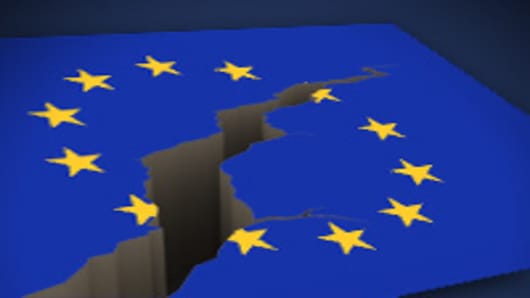The euro was a political project meant to unite Europe after the Soviet collapse in a sphere of collective prosperity that would lead to greater federalism. Instead, the euro seems to be pulling Europe apart.
As European leaders scramble to present a united front for this weekend’s critical meeting in Brussels, anxiety in Europe is growing, and not just about the euro. The assumptions of 60 years suddenly seem hollow, and the road ahead is unclear, as if the GPS system has gone out of whack.
On the surface, the European Union is an enormous success. It has nearly 500 million citizens and a gross domestic product of more than $17 trillion, larger than that of the United States and more than three times China’s or Japan’s. It is America’s largest trading partner by far, and together the two economies account for roughly half the world’s gross domestic product and nearly a third of its trade.
But Europe is in economic and demographic decline as Asia is rising. The European Union’s share of global trade is steadily dropping, especially in exports. Its aging population is placing huge strains on generous social welfare and pension programs and pumping up sovereign debt in an extended period of flat growth.
Technologically, it is behind the United States, but its pay scales are too high to be an easily competitive exporter.
The current crisis over the euro has deep roots in the imbalances between north and south, rich and poor, export-led and service-driven economies, tied together by a currency but few rules, and those rarely enforced.
A fix will require fundamental changes in the functioning of the bloc, with more interference in the workings of sovereign states. There would need to be a fiscal union, with a treasury and a finance minister capable of intervening in national budgets, and more unified tax and pension policies. But it is far from clear that the European Union can gather itself to take these fateful steps away from nationalist identities to a truly European model.
“We are today confronted by the greatest challenge our union has known in its entire history,” said José Manuel Barroso, the head of the European Commission. “It is a financial, economic and social crisis. But also a crisis of confidence — in our leadership, in Europe itself, in our capacity to find solutions.”
There are many who believe that the European Union and its leaders have already been found wanting, and that the European project that brought democracy and peace to the Continent may begin to unravel.
“This crisis is threatening the benefits of 60 years of European integration,” said Nicolas Baverez, a French economist and historian. “All the principles on which the euro zone was built — no state default, no monetary transfers, no bailouts and strict limits on debt — all these principles are dead, and we have no rules to make this work.”
Worse, he said, political leaders underestimate the dangers. “This is not just another recession , but a real and fundamental crisis,” he said. “There is a tension in the political system and doubt about democratic institutions that we have not experienced since the fall of the Soviet Union.”
Built from the ruins of war and expanded generously in the euphoria after the Soviet collapse, the European Union heralded itself as a model, radiating “soft power.” But now the model looks tarnished and flawed.
Leaders seem diminished; local politics trump solidarity. There is a new nationalism degrading the collective responsibility and shared sovereignty that defines the European Union. Euro-skepticism runs from far-right parties that simultaneously detest immigrants, globalism and Brussels to the governing parties of Europe’s most successful countries.
A European Union of 15 nations seemed coherent and manageable; the Europe of 27, soon to be 28, is almost ungovernable, even by a professional bureaucracy with little connection to voters and whose decisions cause increasing resentment, summarized in the “democratic deficit” that the European Union suffers.
The historical ironies are considerable.
Germany, for example, divided and in ruins after the war it fought to dominate Europe, is reunited and dominating Europe now, but without arms and with deep reluctance.
More Europe?
Nothing gets done in the European Union without German agreement, commitment and money. But in Chancellor Angela Merkel, Germany has a leader who is reactive and uninspiring, while her coalition partners, the Free Democrats, are slumping into irrelevance. Her eye is on Germany’s internal politics, its loose federalism and coalition government, a major contrast to France’s centralized, nearly monarchical state.
France once dominated the European Union, but Paris has now fallen behind booming Germany, one reason that François Mitterrand feared German reunification. Anxious about its own debt, banks and credit rating in the midst of a nasty presidential campaign, France is having a hard time dragging Berlin along.
At the same time, the countries of Eastern Europe are more vibrant economically than many of their western partners. They share much of the German, Dutch and Finnish view about strict fiscal discipline, and are reluctant to join a shaky euro and become responsible for the failures of others.
Britain, always an outlier in the European Union, looks wise to reject the euro, and the mood now is probably more anti-European than even in the days of Margaret Thatcher.
The fundamental changes needed to cope with the euro crisis — particularly the historic step of creating a common treasury — would require a redrawing of the basic treaties, which would require the approval of the voters.
But Europe is unpopular, a local metaphor for globalization, faceless and interfering. It is by no means certain that the voters are ready to leap into a new world of economic integration. Even if they prove to be, the new treaty will be complex and take years to draft even before being put to the electorate for ratification, if there is ratification.
It is easy to say that the answer is “more Europe,” not less. That can seem self-evident to Eurocrats and the political elite. But “more Europe” may not be what voters want.
“The only thing that can save the euro in its current form can’t and shouldn’t be done without democratic debate and support,” said Simon Tilford, chief economist for the Center for European Reform, a research institution.
“You need to bring the electorate with you,” he said. Of course, he acknowledged, a real democratic debate “could exacerbate the crisis.” That may be the largest historical irony of all.



